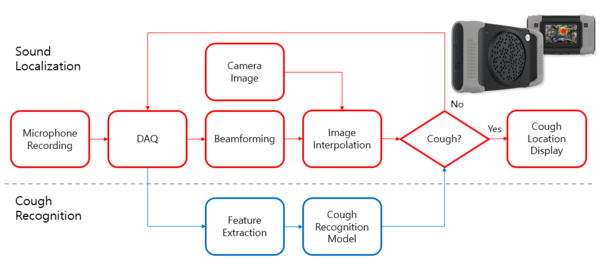A research institute-business enterprise joint team has developed a camera that recognizes cough sound in real-time and displays the coughing person's location as images.
The most common symptoms of Covid-19 are fever and cough. Fever can be easily determined without having direct contact by using a thermal imaging camera. However, it has been challenging to find people who cough without contacting them.
The Korea Advanced Institute of Science and Technology (KAIST) and SM Instrument have developed a deep learning-based model that recognizes cough sound to solve the problem. It also developed a camera that can track and record the cough sound, the position, and the number of coughs in real-time for visualizing those who cough with the same principle of the thermal imaging camera.

The researchers applied supervised learning based on a convolutional neural network to develop the cough recognizing model. They also collected datasets from DEMAND, ETSI, TIMIT, and Audioset, an open voice dataset actively used for research by Google and YouTube, to train and evaluate the model.
The background noise was mixed in the Audioset at a rate of 15 to 75 percent to enhance data, and the volume was adjusted to 0.25 to 1.0 times to adapt to various distances.
The researchers used five acoustic features, such as spectrogram, and seven optimizers to train and measure the accuracy of the test data to check the performance, which resulted in 87.4 percent accuracy of the test. They then applied the trained model to an acoustic camera consisting of a microphone array and camera module for collecting sound.
As a result, when the model recognized cough sound through beamforming for calculating the location of the sound source, contour lines and labels were displayed to indicate that the sound came from coughing.
"The use of cough recognition cameras in public places and clustered facilities will help prevent and detect infectious diseases early amid continuous spread of Covid-19," said Professor Park Yong-hwa of the Department of Mechanical Engineering at KAIST, who led the research.
The study was conducted with the support of the Ministry of Trade, Industry and Energy.

